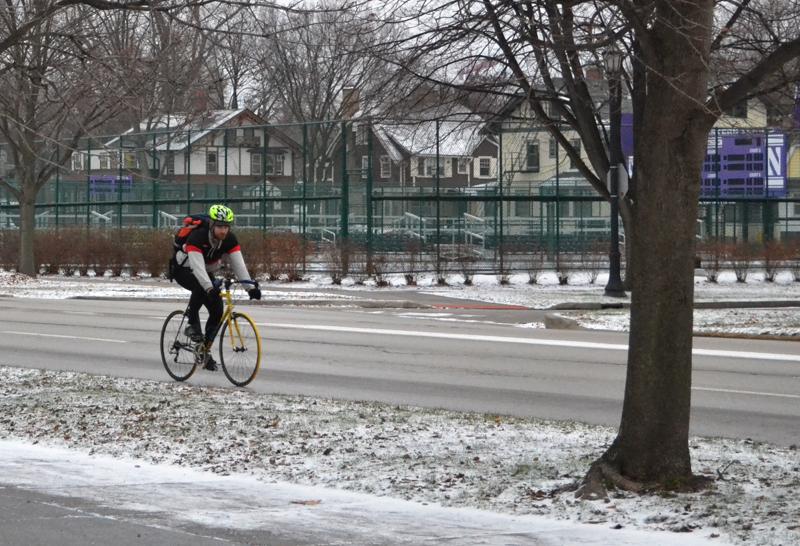Evanston joins more than 600 communities with ‘complete streets’ resolution
Daily file photo by Ebony Calloway
A cyclist bikes on Sheridan Road. City Council passed a resolution last month that will promote public access to alternative forms of transportation, such as bicycling.
February 24, 2014
Evanston joined more than 600 communities nationwide last month that have passed “complete streets” policies to ensure safe and easy passage for pedestrians, cyclists and public transit users.
On Jan. 27, City Council approved a resolution putting into immediate effect the city’s Complete and Green Network Approach, which was developed over the course of the last year by the Evanston Environment Board in conjunction with representatives from the Department of Public Works.
The resolution commits the Department of Public Works to considering both environmental sustainability and ease of public access in all future transportation construction projects.
A total of 610 communities across the nation, including Evanston, have instituted complete streets policies, according to a study released Feb. 18 by the National Complete Streets Coalition, a program that supports communities developing greater public access to more sustainable forms of transportation.
But Catherine Hurley, the city’s sustainable programs coordinator who helped see the resolution through from start to finish, said she believes Evanston’s policy is unique because it incorporates the green component within the complete streets concept.
“I think very few are as wide and encompassing,” Hurley said. “Ours incorporates really any project within the city right-of-way, on a park or on an off-street trail, not just the roadway. So I think we really raised the bar.”
Hurley said the Department of Public Works had already been considering the different factors in all of their individual projects. The department wanted to make the practice more official and recognized as part of a self-assessment process to receive recognition as a sustainable community from Sustainability Tools for Assessing and Rating Communities, a group that promotes and ranks sustainable cities and counties.
“In many ways, we were already doing this anyway, so we just wanted to make it more formal,” Hurley said. “We should be incorporating all of this stuff into a more formalized policy so we can also hold ourselves to it in the future.”
The resolution was also the result of encouragement from the Active Transportation Alliance, a group that promotes complete streets projects in the Chicagoland area. The alliance provided examples of other communities’ complete streets policies to the Evanston Environment Board, who then used these examples to write the proposed resolution for the city.
“It just takes time because our roads in this country were built to move cars. That’s the whole highway system, particularly in the suburbs,” said Nancy Wagner, the alliance’s suburban outreach manager. “We’re starting to change that. … That’s what cities like Evanston are trying to address.”
Natalie Watson, head organizer for Streets Alive!, an annual event that also promotes active travel, said promoting alternative forms of transportation with these types of policies will help promote personal and environmental health in the city.
“Every time we drive a car, we’re putting pounds and pounds of pollution in the air that cause asthma and cancer and other things. So you can make the air quality better by not burning fuel,” Watson said. “There’s some urgency to making our cities more walkable and bike-able.”
Email: [email protected]
Twitter: @kellyagonsalves


